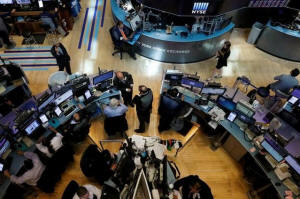|
Softer dollar may be
stock silver lining amid Washington drama
 Send a link to a friend
Send a link to a friend
 [May 20, 2017]
By Lewis Krauskopf [May 20, 2017]
By Lewis Krauskopf
NEW YORK (Reuters) - With S&P 500 companies
set to notch their strongest quarterly earnings growth in about six
years, a weaker U.S. dollar may help keep the profit momentum rolling
and support share prices in the weeks to come.
After a dramatic week in Washington that rattled financial markets, one
possible silver lining for stock investors was the weaker dollar, which
can support earnings of U.S. multinational companies with large foreign
operations.
The dollar <.DXY> weakened 0.5 percent against a basket of currencies on
Wednesday following reports that U.S. President Donald Trump tried to
interfere with an investigation into his former national security
adviser's ties with Russia, revelations that also sparked the S&P 500's
<.SPX> biggest one-day drop in eight months.
The currency was on track for its biggest weekly percentage drop in a
year, and so far in 2017 the dollar has pulled back 5 percent, having
erased its post-U.S. election gains.
Movements in the dollar can be significant for U.S.-based multinational
companies. The stronger the greenback is against other currencies, the
less valuable foreign sales become when they are translated back into
the U.S. currency for reporting purposes.


"A weaker dollar is arguably good for any company that sells overseas,"
said Alan Gayle, director of asset allocation at RidgeWorth Investments
in Atlanta. "If youíre talking about a silver lining, if you are a
large-cap company that has significant overseas sales exposure, then
this is an emerging positive."
First-quarter results from U.S. companies have bolstered confidence in
equities, with the market reaching record highs earlier this month even
as events in Washington threatened Trump's promises of tax cuts,
infrastructure spending and reduced regulation that had helped fuel a
rally in stocks.
With more than 90 percent of the S&P 500 having reported, first-quarter
profits are on pace to rise by 15.2 percent, according to Thomson
Reuters I/B/E/S.
Second-quarter earnings are expected to rise by 8.5 percent, a figure
that could swell depending on currency moves. The dollar has fallen 3.2
percent during the second quarter alone.
Companies with significant global operations have already showed
strength as the dollar has weakened in the first quarter.
S&P 500 companies with more than half their revenue from outside the
United States have reported a 13.2 percent increase in earnings, when
excluding the energy sector. That compares with a 10.6 percent increase
for companies with half or more of revenues coming domestically. Energy
sector results are skewing overall S&P 500 earnings because of year-ago
negative results.
[to top of second column] |

Traders work on the floor of the New York Stock Exchange (NYSE) in
New York City, NY, U.S. May 18, 2017. REUTERS/Brendan McDermid

The S&P 500 has climbed 6.5 percent this year while the Russell 2000 <.RUT>, the
benchmark for small-cap stocks that tend to be more domestically focused, has
climbed only 1 percent.
The weaker dollar "could be a pretty strong tailwind," said David Schiegoleit,
managing director of investments at U.S. Bank Private Client Reserve. "The
companies that garner most of their revenue from overseas sources, that could be
a momentum play if you continue to see a soft dollar."
According to currency risk consulting firm FiREapps, which tracks corporate
commentary on currency effects, the impact of currency moves on U.S. companies
in the first quarter has been similar to that in the prior two quarters.
But the firm cautioned that the first quarter is historically a period with
reduced currency impact, and noted the weaker dollar has created potential for
an increase in international earnings.
Ed Yardeni, president of consulting firm Yardeni Research Inc, questioned
whether the dollar's fluctuations will significantly increase profits, citing
his firm's analysis showing minimal overall negative impact from the currency's
strength in recent years.
"In theory, it should be a positive," Yardeni said. "But as a practical matter
looking at the past two years, it didnít really show up as a major drag on
earnings, so Iím not sure itís going to suddenly be a major boost to earnings as
it reverses itself.Ē
The dollar also remains generally above levels where it was during the second
quarter of 2016 even as it has softened this year.
Peter Andersen, chief investment officer with Fiduciary Trust Company in Boston,
worries over what the weakened dollar reflects about global attitudes on the
U.S. economy's health.

"I tend to think when the dollar trades off that itís more of a sentiment
reading," Andersen said. "So that has more concern to me than the positive
byproduct of foreign currency translation giving a boost on earnings."
(Reporting by Lewis Krauskopf; Editing by Meredith Mazzilli)
[© 2017 Thomson Reuters. All rights
reserved.] Copyright 2017 Reuters. All rights reserved. This material may not be published,
broadcast, rewritten or redistributed. |